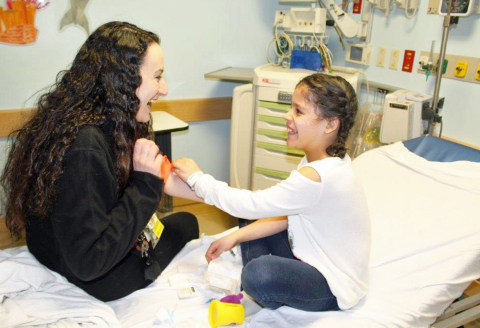Often known as “forgotten patients,” many childhood cancer survivors face long-term side effects and medical complications post-treatment. It is up to the health system, and individual, to ensure they follow personalized screening plans to identify and address late-effects as early as possible. Dedicated survivorship programs can help develop survivorship plans, and facilitate needed screening procedures, however, can be associated with significant costs.
This press release features multimedia. View the full release here: https://www.businesswire.com/news/home/20200108005582/en/

A patient at Cohen Children's Medical Center (Photo: Business Wire)
For the first time, costs of survivorship care in relation to survivor adherence and health system revenue were examined by Jonathan Fish, MD, member of the Feinstein Institutes for Medical Research. This research was published in the journal Translational Behavioral Medicine.
Results from the study, titled “Cost of Survivorship Care and Adherence to Screening–Aligning the Priorities of Health Care Systems and Survivors,” may better inform decision-making within health care systems and drive institution, or policy-level changes, to better support clinical efforts to improve patient adherence and the long-term survivorship care of childhood cancer survivors.
The need for long-term care
Approximately 80 percent of children diagnosed with cancer are cured of their disease, which equates to more than 500,000 childhood cancer survivors currently living in the United States. As a result of their exposure to various treatments, such as chemotherapy, radiation, and surgery, survivors experience high rates of illness and mortality due to secondary health problems. As many as 95 percent of survivors will develop a chronic disease due to treatment effects.
Screening guidelines for long-term follow-up care exist, however, some research suggests that adherence to post-treatment screening remains sub-standard, even among high-risk survivors. Therefore, there is a need to better understand how follow-up care adherence is related to hospital-level finances. Such an understanding may lead to increased support for survivorship care programs.
Examining care versus cost
Revenue generation is one factor that influences decisions about resource allocation within health care systems. Survivorship care can be labor and time-intensive, and health system reimbursement for survivorship visits may be limited compared to other care service lines.
Dr. Fish and colleagues’ study reexamined data collected from previous research that took place between 2010 and 2012. They analyzed 286 childhood cancer survivors who were followed in the Survivors Facing Forward program, a long-term survivorship program within the Division of Pediatric Hematology/Oncology and Stem Cell Transplant at Cohen Children’s Medical Center in New Hyde Park, NY.
The data reviewed included sociodemographic information, cancer history, treatment and results from screening tests like breast mammograms and ultrasounds. Financial data about procedure costs and reimbursement to the health system were then obtained to evaluate the projected and actual costs of procedures and reimbursement to the health system, based on insurance status.
The results show that the overall rate of adherence to recommended procedures was 50 percent. The average cost of recommended procedures for the adherent group was $1,211, whereas the projected cost for the non-adherent group was significantly higher at $2,469. Thus, the non-adherent group left more potential revenue (“lost opportunity cost”) for the health system.
It was estimated that per visit, the health system received an average of $850 in profit for patients in the adherent group. Conversely, the non-adherent group’s recommended care included higher cost procedures with a more considerable potential profit margin for the health system. It was estimated that the health system would have received an average of $1,932 in profit per visit if these patients had completed all recommended procedures.
The total lost profit to the health system due to non-adherence was $311,850.
Potential for reform
“The findings show that a modest investment of resources on the part of the health system to improve adherence amongst survivors can provide a positive return on investment,” said Dr. Fish, Section Head, Survivors Facing Forward program, Cohen Children’s Medical Center. “Small changes, like communication between survivor teams and health system administration, can have a big impact on improving care for survivors.”
Dialogue between care-support teams and administration around patient barriers may be able to increase patient-adherence, with a minimal investment of time and resources. This action could improve the health and quality of life for survivors and provide a return on investment for the health system.
“Recognizing that patient care is the utmost priority for all health systems, it’s imperative that we implement programs that patients can successfully adhere to in the long term,” said Charles Schleien, MD, senior vice president and chair of pediatrics at Northwell Health. “Doing so not only aids in keeping our patients cancer free, it also improves their overall quality of life for years to come.”
About the Feinstein Institutes
The Feinstein Institutes for Medical Research is the research arm of Northwell Health, the largest health care provider and private employer in New York. Home to 50 research labs, 2,500 clinical research studies and 4,000 researchers and staff, the Feinstein Institutes is raising the standard of medical innovation through its five institutes of behavioral science, bioelectronic medicine, cancer, health innovations and outcomes, and molecular medicine. We’re making breakthroughs in genetics, oncology, brain research, mental health, autoimmunity, and bioelectronic medicine – a new field of science that has the potential to revolutionize medicine. For more information about how we’re producing knowledge to cure disease, visit feinstein.northwell.edu.
View source version on businesswire.com: https://www.businesswire.com/news/home/20200108005582/en/

























